|
13 Market Street
Dover
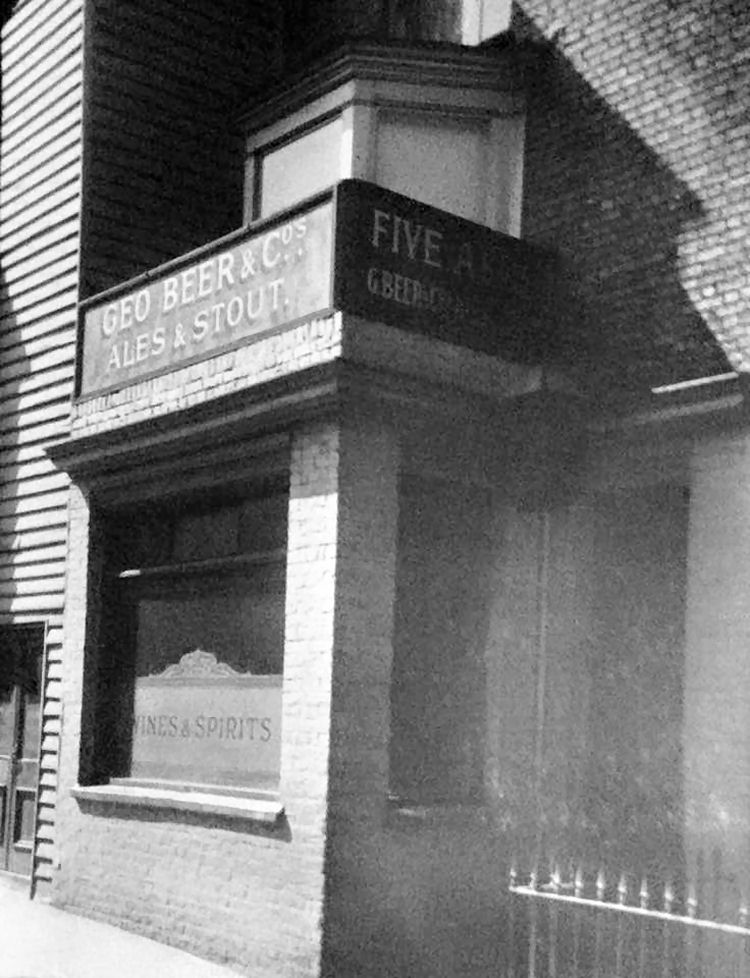
Above photo from the John Gilham collection, 1920.
|
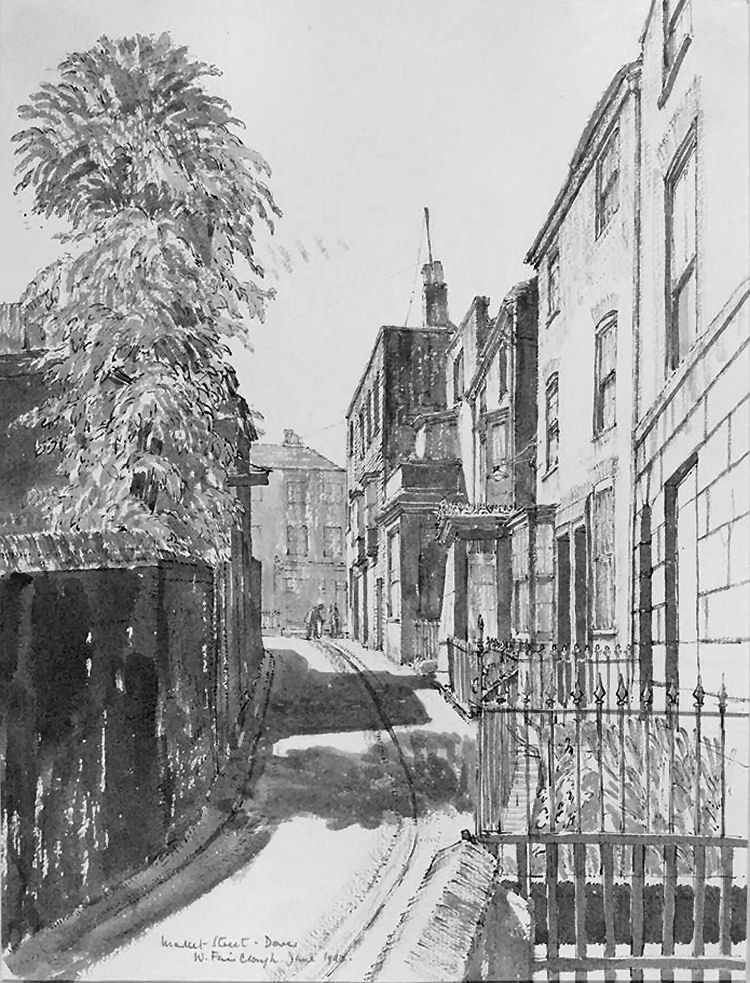
Above painting by W. Fairclough, June 1942. |
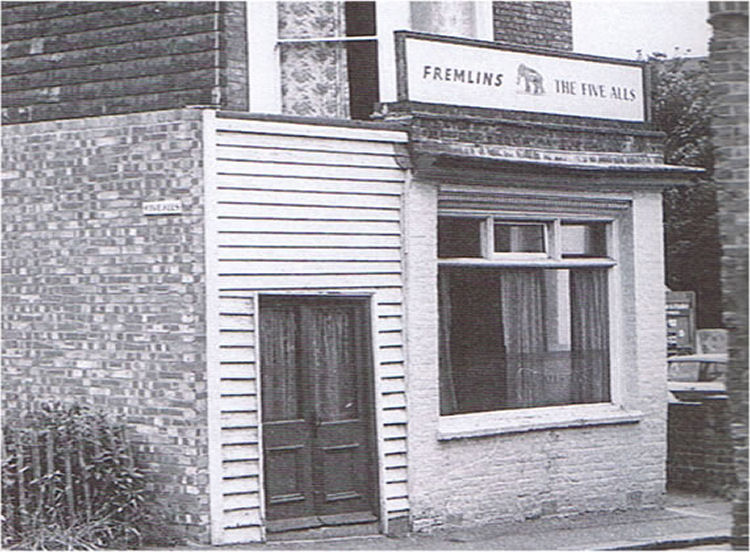
Above photo circa 1958. |
The pub closed on 14 July 1968. It was a compulsory purchase by the town
and the ground then lay idle for twenty two years before being redeveloped.
I never saw any price or compensation figure divulged.
It was rumoured to be over two hundred years old and to have formed part
of a smuggling chain in the past. A secret room was indicated and
underground tunnels were purported to run to the "New Inn" and the "Cause is
Altered", both in the vicinity.
8th September 1864 saw this public house auctioned at the "Royal
Oak" as Lot 3 of 27 lots owned by the "Jeken,
Coleman & Rutley" Brewery of Custom House Quay. The advert stated:-
"All that Freehold and eligibly-situate Public-house, known as the
"FIVE ALLS," with the out-buildings thereto belonging, situate in Market
Street, now in the occupations of Mr. C. Hudson."
Many inns have this title but often different characters are used. The
five faces portrayed here were those of a lawyer, priest, farmer, soldier
and the devil, with the caption, "I plead for all", "I pray for all", "I
work for all", "I fight for all" and "I claim all". You were served by
George Hudson in 1849 and at the close by Mr. Pratt.
The street was closed to traffic from 1971 and to pedestrians from 1989.
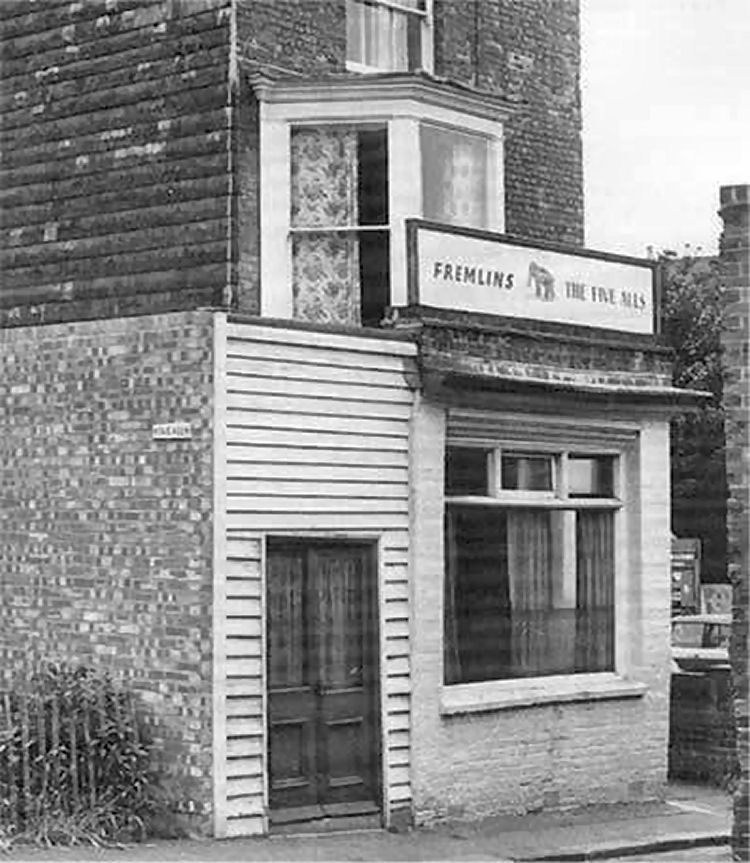 |
|
From the Dover Telegraph and Cinque Ports Advertiser,
28 August, 1849.
George Isted alias Durgan, remanded from Friday, on
suspicion of being concerned in a robbery at the "Five Alls," Market
Street, was again brought up, and, from the absence of direct evidence,
released from custody - the Bench significantly telling the suspected
party to remember that the police had very peremptory orders to observe
his conduct.
|
|
From the Dover Telegraph and Cinque Ports General
Advertiser, Saturday 15 May, 1858. Price 4d.
FIRE IN MARKET STREET
The residents in this part of Dover were thrown into a state of alarm on
Monday in consequence of a fire breaking out in the locality.
Immediately on its discovery intelligence was communicated to Captain G.
T. Parks who with his staff and apparatus promptly repaired to the scene
of the conflagration in an outbuilding in the rear of and connected with
the Five Alls occupied by George Hudson fly proprietor &c. The flames
were bursting through the roof on the arrival of Mr. Parks. A hasty
glance sufficed to show that there was not a moment to be lost but only
in confining the devouring element to the premises in which the fire
originated but in preserving from destruction the heterogeneous mass of
buildings in immediate proximity thereto.
A double branch service was instantly attached to the nearest hydrants
and the influence of well-directed and ample supply of water in
retarding the progress of the flames was soon observed. In a moment of
apprehension parties occupying adjacent property had commenced removing
their goods. Such was the energy displayed in extinguishing the fire. So
effective the means available in connection with the Dover Water Works
that half an hour sufficed for Mr. Parks to announce that the fire was
controlled and its spread beyond the walls of the doomed edifice in
which it broke out prevented. The alarm had been given about six o'clock
and before seven o'clock the order to turn off the water preparatory to
an examination of the interior of the premises was issued. The majority
of those who had congregated to witness the catastrophe were at that
hour retiring from the spot. The subsequent proceedings principally had
reference to a pre-cautionary removal of the smouldering wreck of the
conflagration but no fresh outbreak resulted.
As we have already stated the buildings in which the fire originated and
to which happily it was confined was in the rear of the “Five Alls”
Market Street. It was of two storey's the ground floor forming the
wash-house or scullery of the “Five Alls” as well as a portion of “The
Tap” and the second floor (formally dormitories for travellers) being
used as a straw and fodder loft. On Saturday a ton of straw was stored
away there and on Monday a ton of sainfoin was added to the contents of
the loft.
The cause of the fire was correctly conjectured on Monday evening but it
was not satisfactorily ascertained until Tuesday morning. It appears
that in the washhouse of the ground floor there was a copper, which was
used on Monday. The flue of the copper passed into the chimney of the
premises but at its junction with the chimney there was a fracture
sufficiently large to admit lighted soot or other ignited substance
falling immediately on some rafters below. The state of the rafters
showed that such an occurrence must have taken place and hence the
conflagration. The premises are the property of the Messrs Coleman &c.
brewers and are insured in the Globe.
|
|
From the Dover Express and East Kent News, Friday, 31 October, 1890. Price 5d.
ROBBING A TILL
William Bonsor, a lad not quite 16 years old, was charged with stealing
on the 27th, from a till at the “Five Alls” public house, six shillings
and nine sixpences. The landlord, Mr. John Golder, said that he went to
his till which is under the counter, about twenty minutes to eight that
morning, and put five shillings, and ten sixpences there. Miss Ellen
Golder, daughter of the last witness, said that about five minutes past
eight that morning, a customer came in, and she served him with a
penny-worth of tobacco, he offered her a shilling in payment, and she
gave him sixpence and fivepence in coppers. About two minutes
afterwards, the prisoner came in, and asked for a penny-worth of
tobacco, she served him and he gave her a 1d. he went out, and about
three minutes after he came back; she was in the passage then, and could
see in the bar, she served him with a short pipe, but he did not pay
for it. He then went out again and shut the door after him. She took two
books from the bar into the parlour, but did not hear anyone come in
whilst she was in there. About two minutes after, she went back into the
bar, and saw the till was open and also the door, the bowl and its
contents were gone, as well as the keys. Anyone could reach over the
counter, and get at the till. She told her father, and he gave
information to the Police. The coppers were left in the till. Sergeant
Stevens said that at twenty minutes past eight that morning, in
consequence of information received, he went in search of the prisoner.
He went to Mr. Mowll's coal yard, and found that the prisoner worked
there. He had him called into Mr. Mowll's office, and asked him if he
had been home to breakfast, he said he had; he then asked him if he had
called anywhere on his way back, and he said he called at the “Five
Alls” for some tobacco and a pipe, but denied having robbed the till. He
admitted having 9s. 6d. but said he had picked up a purse containing it
going through Chapel Place. When charged before the Magistrates, the
prisoner pleaded guilty, and was sentenced to three months hard labour.
|
|
The following letter has been kindly sent to me by Dennis Groombridge. I
assume it was on display in the pub between 1934 and 1938 while Bill
Bates was licensee.
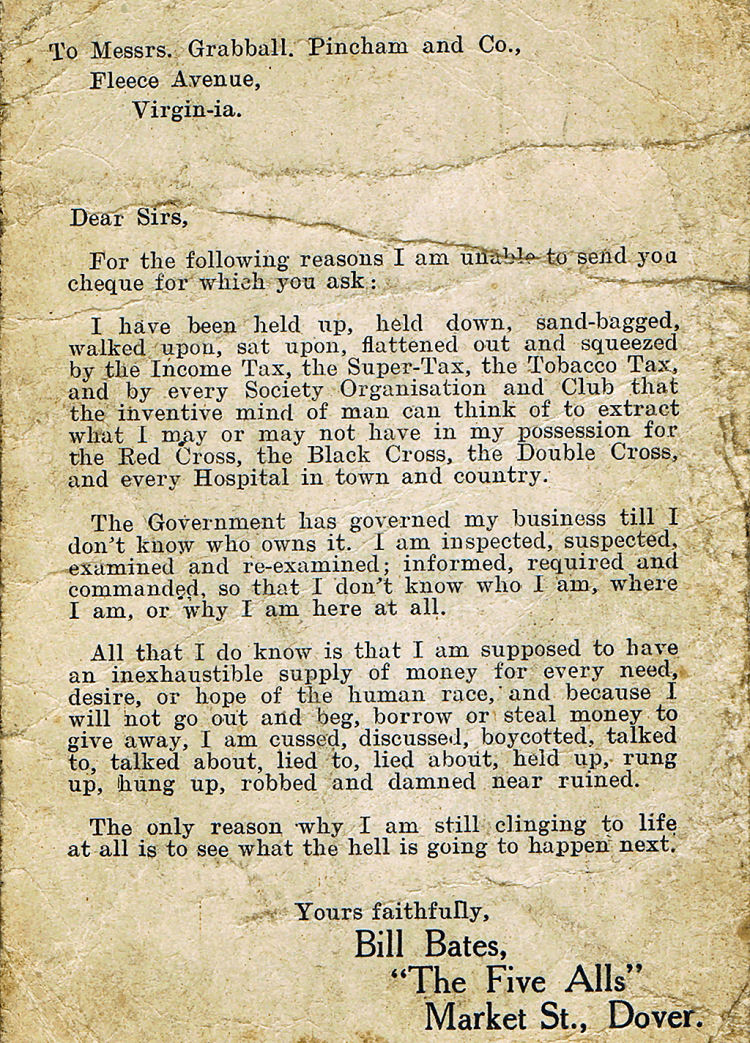
Again, kindly sent by Dennis Groombridge, is Bill Bates membership card
for "Ye Ancient Order of Froth Blowers.
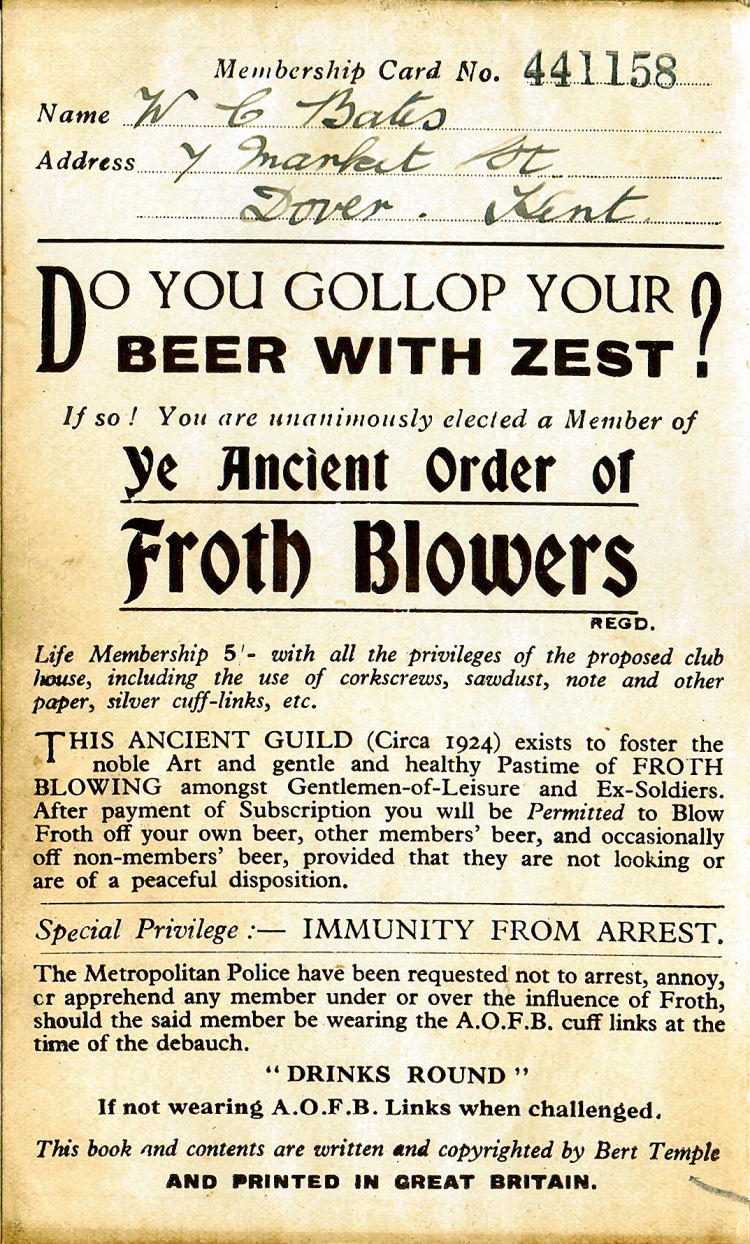 |
|
Dover Express 03 February 1933.
OBITUARY. MR. F. G. HICKMAN. FIVE ALLS, MARKET ST.
Mr. F. G. Hickman. The funeral took place on Saturday, at St. Mary's
Cemetery, of Mr. Frederick George Hickman, landlord of the "Five Alls"
Inn Market Street. who died on January 24th, at the age of 60 years. The
Rev. W. A. M. Parker officiated. The late Mr Hickman was educated at the
Hastings Grammar School., and was well known in that town. He served
with distinction during the South African War, and was for some years in
the South African Constabulary. Subsequently he travelled extensively in
Russia and Poland. During the European War Mr. Hickman with the
Recruiting Officer at Hastings, and afterwards at the offices of the
Southern Railway Company at London Bridge, eventually resigning to
become licensee of the "Five Alls" Inn at Dover. The mourners present
were:—Mrs. P. G. Hickman (widow), Miss Hickman (Hastings) (sister). Mr.
R. F. Parkhouse (Luton) and Mr. H. McLellan Smith (Cheam)
(Brothers-in-law), Mr. and Mrs. W. Marsh, Mrs. Perry. and Mr. G. Elve,
The Dover & District Licensed Victualler' Association was represented by
Mr. G. Taske (President), Mr. T. Selth (Chairman), and Mr. Terry
(Vice-President).
|
|
From the Dover Express and East Kent News, Friday 9 June, 1933.
LICENSING TRANSFER SESSIONS.
The "Five Alls," Market Street, from Gladys Hickman to Ernest Simmons,
late of the "Five Bells,” Brabourne.
|
|
From the Dover Express, Friday 1 September 1939.
INN SIGN LORE.
Inn sign lore for the public is being provided by the brewing industry.
Many thousands of copies of an illustrated beeolet, "Inn Signs: Their
History and Meaning," by Sir Gurney Benham, F.S.A., are to be issued
during the next few days, by the Brewers' Society, to inns all over the
country. They will be dispensed over the bar to any customer buying a
glass of beer.
A Dover Inn is one of those referred to, i.e., "The Five Alls." This
sign varies pictorially and there is no hanging sign at the Dover Inn.
Of that shown in the book, Sir Gurney Benham writes:
"This eccentric sign, of uncertain origin, dates from the 18th century.
It shows the four leading estates or professions of the realm; The
Ecclesiastic ('I pray for all'); the Lawyer ('I plead for all'); the
Farmer ('I feed all') and the Soldier ('I fight for all') and last, but
not least, is shown the Devil ('I take all'). The sign has died out in
London, but is found in Dover, at Walpole St. Peter in Norfolk, and it
occurs elsewhere. Sometimes it shows the King ('I govern all'); a Bishop
('I pray for all'); a Lawyer ('I plead for all') and a Labourer ('I pay
for all').
One Dover in sign, that of "The Cause is Altered" is not referred to and
it would be interesting to know if it exists elsewhere. The story is
that the name dates from 1826. In the late John Bavington Jones'
"Dover," the writer says, "An old inhabitant told us that he saw the
sign fixed there before he went to sea, in the year 1826. The sign of
this house was originally "The Black Horse," and, being situate on a
lonely spot on the Town Walls, was a resort of smugglers, but when Mr.
Bourne took the house, at the beginning of the nineteenth century, he
resolved to make a change for the better and put up a new sign "The
Cause is Altered."
Sir Gurney Benham's explanation of some other Inn signs removed various
misconceptions.
The "Elephant and Castle," for instance does not derive its name from "Infanta
of Castille," but is the crest of the Cutlers Company, the elephant
being included "possibly because cutlers use bone for knife handles and
like to pass it off as ivory."
The "Elephant and Castle" is also the Crest for the Corbet family, but
the old and famous inn of this name at Newington Butts, is said to
commemorate the discovery of an elephant's skeleton there, in 1714.
The booklet also refers to the "pretty tale that the "Goat and
Compasses" is a corruption of 'God encompasses us'." "There is not a
word of truth in it, it is stated. "This was a beckoning sign to thirsty
shoemakers and builders." The arms of the Cordwainers (shoemakers) were
three goats' heads, and those of the Carpenters contained three
compasses.
The "Pie" (or magpie) may have been chosen as an appropriate sign for
taverns where men met for social chatter, and the "Swan" may have been a
favourite sign because the long neck suggested a good imbiber - which
may account for the popularity of the "Swan with Two Necks."
Sir Guy Benham discloses also that Queen Elizabeth had portrait signs at
various "Queen's Head" Inns destroyed unless they complied with her
official portrait.
|
|
From the Dover Express, Friday 11 March, 1949.
A music and singing licence was granted to the "Five Alls,"
Market St.
|
|
From the Dover Express and East Kent News, Friday,
17 June, 1949.
ALTERATIONS
Plans for the removal of partition between the public and private bars
were approved by the Magistrates on Friday.
|
|
From the Dover Express and East Kent News, Friday, 17
November, 1950.
LICENSEE RETURNS TO GARDENING
Former licensee of the "Five Alls," Market Street, Robert George
Burton, appeared at Southampton Bankruptcy Court last week, with
liabilities of £593/3/4.
At one time gardener to the late Mr. Walter Hutchinson, at Stanbridge
Earls, near Romsey, he left that work in November, 1948, to become a
licensed victualler at Dover. He ceased that business in March of this
year.
Burton told the Court he borrowed money and used his savings up to
fit up the public house in Market Street, Dover. He attributed his
failure to competition, the loss of £33 by a robbery, and fluctuations
in trade. He had now, he said, returned to his old job as head gardener
at Stanbridge Earls.
|
|
From the Dover Express 19 June 1968
ANCIENT INN GOES TO MAKE WAY FOR PROGRESS
ANOTHER of Dover's ancient
inns closed this week. It's the Five Alls public house in Market Street,
which is to come down to make way for the proposed York Street road. The
premises have been purchased under a compulsory order.
The hosts, Mr. and Mrs. Harry Pratt, called "Last orders" on Sunday.
Dover will lose
little in architectural value with the destruction of the pub. But it is
one of the most interesting in the town. Its age is not known but it is
believed to be more than 200 years old.
Miss O. M. Rookwood, former
teacher at Dover Grammar School, and who now occasionally lectures on
ancient Dover, says there is a "secret room" on the premises. This
cannot be seen from outside.
Miss Rookwood says that there is an
underground passage leading from the "Five Alls" to the nearby "Cause is
Altered" public house - although the passage is partially blocked.
Another interesting public house, the demolition of which is now
complete, is the "Trocadero," in Snargate Street. This has also come down
to make way for the new road.
Under present plans, it is expected that
the "Cause is Altered" -probably the town's oldest public house - will also
be demolished to make way for the road.
The name "Five Alls" is a bit
of a mystery. But a picture in the bar shows five faces - a lawyer, a
priest, a farmer, a soldier, and the Devil. The caption reads; I plead
for all, I pray for all, I work for all, I fight for all, and I claim
all.
|
|
From an email received, 8 January, 2017.
I have just been reading the information on your site.
I am the Grandaughter of George Percival Nightingale and I lived in
the "Five Alls," Public House Market Street Dover between 1953 and 1956.
The tunnel was under the public bar and did indeed go to another pub
and further to the cliffs. My Grandfather told me that it was used to
smuggle brandy in from the boats.
There was indeed a secret room, access was from a secret door on the
middle landing, up a winding stairway to a loft bedroom with a small
oval window in the roof. This was my bedroom.
The Roman Painted House was found behind the pub in the 1970s. We
found several items of Roman Pottery and several large canon balls in
the cellars (I don't know what happened to them). There were also
several sets of stone steps also in the cellars going in different
directions (the cellars were huge and arched). The tunnel was chalk with
some stone steps and quite tall. My Grandfather was 6ft 6ins and he had
to bow his head so maybe 6ft tall and about 3ft wide. The tunnel went in
for about 12ft straight towards the back of the pub, then veered right
and down a slope. (We were not allowed to go in really but we did)
eventually my grandfather fixed a wooden door to the opening to stop us.
In the yard (towards the back of the pub, but on the left of the
building behind the men's toilets) there was a huge stone rimmed hole
with a grating on it. We were told it was for air to the tunnels.
I hope this interests you, I have many memories of my time there.
Regards.
C. B. |
LICENSEE LIST
SHILLING Thomas 1841+ (age 50 in 1841 ) )
HUDSON George 1849-Jan/60
dec'd
  (Extra history)
(Extra history)
HUDSON Mrs Elizabeth C 1861-Oct/69
dec'd
 
POST Elizabeth S Mrs 1861-74 (daughter of above) (age 63 in 1861 ) )

TOMLIN John 1881-July/1882 (age 55 in 1881 ) )
 
 SIMMONS Bayden Mr July/1882+
SIMMONS Bayden Mr July/1882+

COMFORT Mr Jessie Jan/1883-Mar/84

GOLDER John Mar/1884-Dec/1902
      
(Golder was referred to as also a basket maker as well as publican)
LLOYD Arthur Dec/1902-09 end
 
BLACKMORE William Head 1907-Nov/11 (age 43 in 1911 ) )

PAYNE/PALE ? William
Nov/1911-13 end ? William
Nov/1911-13 end  
DIXON George 1911-13 end?
 1922 1922
DIXON Mrs E R 1913-Dec/21

SMITH William James Dec/1921-28 end
 
HICKMAN Fred George 1928-24/Jan/33 dec'd
 
HICKMAN Mrs Gladys M Mar/1933-April/33

 SIMMONS Ernest Apr/1933-Dec/34
SIMMONS Ernest Apr/1933-Dec/34

 BATES William James Elliott Dec/1934-38 end
BATES William James Elliott Dec/1934-38 end
  
MALTBY Reginald Harry
 1938-Jan/40 1938-Jan/40

MARTIN Wilfred Jan/1940+

RUFF Ernest Frederick to Jan/1949

Closed during the war and reopened 7 Jan 1949
BURTON Reginald C Nov/1948-Mar/50
 
WADE William A 1953 end

NIGHTINGALE George P 1953-60+

PRATT Harry 1963-68 end
William Payne was written as William Pale in the Dover Express, and was
reported as formerly being a book binder.
Wilfred Martin in 1940 was Secretary to Messrs. George Beer, Rigden and
C0., Ltd. brewers, Faversham.

William James Smith was previously a fireman platelayer on the South Kent
and Chatham railway.

 From
the Post Office Directory 1851 From
the Post Office Directory 1851
 From Melville's Directory 1858 From Melville's Directory 1858
 From the Post Office Directory 1861 From the Post Office Directory 1861
 From the Post Office Directory 1874 From the Post Office Directory 1874
 From the Post Office Directory 1882 From the Post Office Directory 1882
 From the Post Office Directory 1891 From the Post Office Directory 1891
 From Pikes Dover Blue Book 1895 From Pikes Dover Blue Book 1895
 From the Kelly's Directory 1899 From the Kelly's Directory 1899
 From the Post Office Directory 1901 From the Post Office Directory 1901
 From the Post Office Directory 1903 From the Post Office Directory 1903
 From the Kelly's Directory 1903 From the Kelly's Directory 1903
 From Pikes Dover Blue Book 1909 From Pikes Dover Blue Book 1909
 From the Post Office Directory 1913 From the Post Office Directory 1913
 From the Post Office Directory 1922 From the Post Office Directory 1922
 From Pikes Dover Blue Book 1923 From Pikes Dover Blue Book 1923
 From Pikes Dover Blue Book 1924 From Pikes Dover Blue Book 1924
 From the Post Office Directory 1930 From the Post Office Directory 1930
 From Pikes Dover Blue Book 1932-33 From Pikes Dover Blue Book 1932-33
 From Pikes Dover Blue Book 1938-39 From Pikes Dover Blue Book 1938-39
 From the Post Office Directory 1938 From the Post Office Directory 1938
 From the Kelly's Directory 1950 From the Kelly's Directory 1950
 From the Kelly's Directory 1953 From the Kelly's Directory 1953
 From the Kelly's Directory 1956 From the Kelly's Directory 1956
 From the Dover Express From the Dover Express
|





